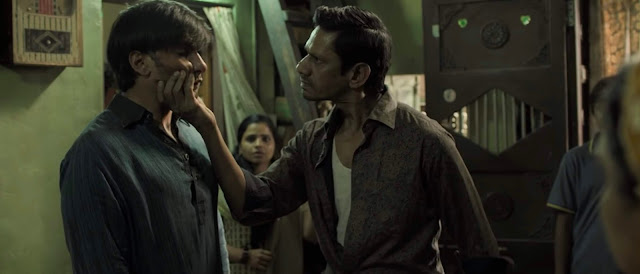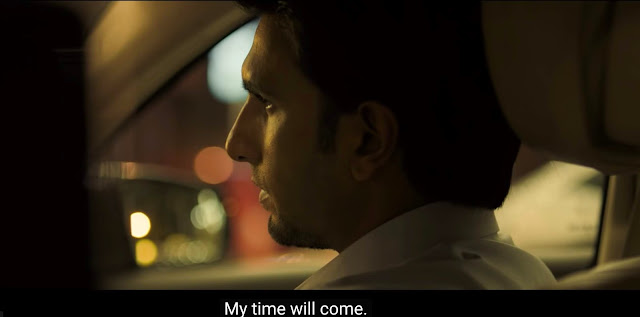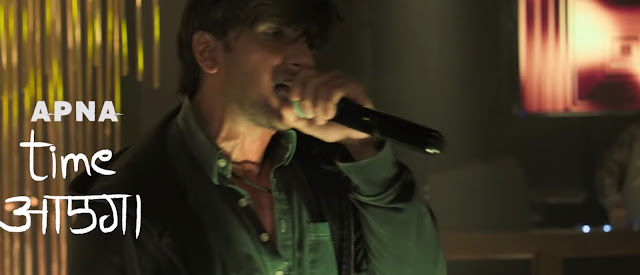Zoya Akhtar’s exquisite Gully Boy tells this story of Murad as he goes on a personal journey of waiting for his time from a budding poet to a famous rap artist. Murad is the son of Aftab (Vijay Raaz) and Razia (Amruta Subash) living in the cramped slums of Dharavi. He is in a long-term relationship with his girlfriend Safeena (Alia Bhatt) who is studying to become a surgeon. Murad meets an artist MC Sher (Siddhant Chaturvedi) who helps him create a rap song video that ultimately paves the path for his success. Gully Boy is loosely inspired by the story of Divine and Naezy who found fame by rapping about their life experiences.
Gully Boy is a film about dreams. It is about dreams that help escape the stress of everyday life. It is about dreams that give hope for a better future. It is about dreams that won’t let you think of anything else. Koi badi murad agar sapne mein dikh jaaye toh uske liye try karneka na. If you dream of a big desire, is it worth chasing? Murad dreams of a better life for himself. Safeena dreams of being a surgeon. Razia dreams of her son who will take them out of poverty. Usko leke bade khwaab hai mere. It is about not giving up on those dreams even if they do not match your existential reality. It is about making sure that your reality catches up with the dreams. Main nahi badalta apna sapna apni sachai se mel khaane ke vaaste. Main apna sachai badlega jo mere sapne se mel khayega. What is a life worth if one has to compromise even his dreams? Murad wants to break the rules of society that a driver’s son can only be a driver. He has an equal right to dream. Zinda mera khwaab. Ab kaise tu dafnaayega.
Zoya Akhtar’s oeuvre has always emphasized the importance of dreams and espoused her characters to follow them. The first lines in her first film Luck By Chance encapsulate the theme of dreams in the film. Aamir Khan while shooting for a period film says, “Lekinsirf wohi sapna saakar hota hai jo lakh samjhane par bhi insaan bhulana nahi chahta.” Everyone dreams but only that dream gets fulfilled which a person does not want to forget, in spite of being told to forget it. This, essentially, becomes the motto for Vikram (Farhan Akhtar) to fulfill his dream of becoming an actor. Dreams come up again when Vikram goes for his audition at Romy Rolly Productions where the song Sapnon Se Bhare Naina plays. The lyrics talk about the twinkle of dreams in the eyes of the dreamers. Sapnon se bhare naina, na neend hai na chaina. When there are dreams in your eyes, there is neither sleep nor peace. The song is shot in a room full of men who are auditioning to become actors. There is someone in the room who does not even have any money to buy a new pair of shoes. He does not know English, and is a little embarrassed to ask for Vikram’s help in filling the form but he is here just to fulfill his dream to become an actor. In Zindagi Na Milegi Dobara, Laila (Katrina Kaif) encourages Arjun (Hrithik Roshan) to follow his dreams. At another stage, Kabir (Abhay Deol) argues with Natasha (Kalki Koechlin) as to why does she plan to quit her job after their wedding. It was her dream and she should continue to work on that. Natasha wants different things in life because her dreams have changed. After all, the rich have the privilege of changing their dreams as often as they want.
In Sheila Ki Jawaani of Bombay Talkies, Katrina Kaif, playing the Manic Pixie Dream Girl, tells Vicky (Naman Jain) who wants to become a dancer that it is important to preserve one’s dreams and for that, he might even have to lie. “Kabhi kabhi apne dream ko chhupana padta hai. People always don’t understand you, so they will discourage you. Lekin tumhe to pata hai na, tumhara sapna kya hai, toh uska khayal bhi tumhe rakhna padega. Jaante ho tum jo chaho kar sakte ho, jo chaho ban sakte ho. Follow your heart for there is magic in your dreams. If you believe them, they will come true. Bas yakeen karo ki aisa hoga aur tumhe koi nahi rok sakta.” In Dil Dhadakne No, Kabir (Ranveer Singh) is taken aback by the fearlessness of Farah (Anushka Sharma) to follow her dreams. He never thought of rebelling, but only after meeting Farah, he gets the courage to talk to his parents that he wants to do something in the field of flying. In addition, there is the film’s title song that says, “Hum toh yehi samjhayenge usey, sapne jo hai sajaane thode se bano diwaane.” We’ll only say to him, that if you want to fulfill your dreams, be a bit crazy.
All of Zoya Akhtar’s films have talked about dreams but Gully Boy is closest to Luck By Chance in terms of other themes, characters, and treatment. Luck By Chance narrated story of two struggling actors, Sona (Konkona Sensharma) and Vikram (Farhan Akhtar), trying to make it in the Hindi film industry. The film commented on the role of luck, destiny, and persistence in our lives. In one particular scene, Sona’s dream is shattered after she learns that she is not going to play the lead role in the film that was promised to her. She laments that maybe it is not in her kismet to be an actress. Vikram disagrees as he believes that kismet is for those who do not have the strength in them to make their own life. Will some other person tell her that she cannot be an actress? He consoles her that all this time, she believed in someone else; now, she has to believe in her self to make the decisions of life. Chances are not given; they are made. Kamayaabi hum tak nahi aati, humein kamyaabi tak jana hota hai. Apne raaste par chalte raho. Dheere dheere sari duniya tumhare raaste par aa jayegi. Success does not come to us; we have to chase success. Keep walking on your chosen path and the world will change its path to come to you. In Gully Boy, Murad and his father Aftab have a conversation that is similar to the one above. Murad leaves the job at his uncle’s office because he did not like the way he was treated there. His uncle told him that a servant’s son can only be a servant. His father tells him that it is the truth but Murad says, “Koi dusra batayega mereko main kaun hai?” Will someone else tell me who I am? This is just like the way Vikram tells Sona that will Chaudhury tell her that she cannot be an actress. Aftab then counsels Murad to change his dreams and accept his reality that he is never going to make it big. Murad disagrees and says that he will change his reality to match with his dreams; just like Vikram believed that the world will follow you and come to your path if you never give up.

One of my favorite things in the movies is to watch people encouraging and empowering each other. The characters in Gully Boysupport each other, many a time, putting their personal ambition behind. From the first moment that they meet, MC Sher pushes and supports Murad. He guides him and helps create his first video. He motivates him to not let insults bother him. I kept thinking that at some point MC Sher and Murad will enter into some kind of competitive confrontation. But the film never hinted at any kind of animosity between the two. The film’s subversion comes across in these little moments. Even after MC Sher does not make it to the top five at the competition, he is happy about Murad making the cut. Murad never fails to thank him. When Sky (Kalki Koechlin) offers him a contract, he conveys to her that it was all due to MC Sher, after which they both collaborate with her. In another lovely moment before his final performance, Murad hugs Sher and almost starts crying because he would not be there without him. Later, when Moeen is behind the bars, Murad is ready to give up everything because he realizes that when no one was there for him, it was Moeen who helped him give shelter. The name Moeen also means a helper or a supporter. Friends really stand up for each other in Gully Boy. A friend takes them to the Benetton store at night at the risk of losing his job. Murad’s relationship with Safeena also displays this unbridled espousal. “Tereko jo karne ka hai, tu kar,” says Safeena. You do whatever you want. She is ready to financially take care of him after they get married and he can continue to do his music thing. She adds that Murad does not try to change her. He accepts the way she is and lets her be. Sometimes, just doing nothing becomes the greatest act of championship. This is a complete contrast to Vikram’s behavior in Luck By Chance where he behaved in the most selfish way, actively sabotaging other people’s chances to make it big. When his friend Abhi (Arjun Mathur), with whom he was staying, applies for the same acting role, Vikram’s face shows apprehension as he does not want to compete with him. Vikram makes new friends after he finds success, forgetting the old ones who were there for him earlier. “Unhe mat bhoolo, joh tumhe tab jaante the jab tum kuch nahi the,” says Shah Rukh Khan to Vikram at some party, “kyunki bas yeh hi hai, joh tumhe hamesha sach bolenge.” Never forget those who were there with you when you were a nobody because only those will always tell you the truth. Murad does not need this lesson as he already follows this in spirit. He remembers to thank all his friends and pays back to Moeen for his generosity.
The familiar terrain of dysfunctional family dynamics in Zoya Akhtar’s films can be seen in Gully Boy as well. The aspirations of children are repressed by their parents. Mothers are close to sons (Murad and MC Sher). Fathers are close to daughters (Safeena). The three younger kids—Murad’s brother, Safeena’s brother, Murad’s cousin—are almost always quiet in the presence of their horrible parents and meekly obey their orders. Even the rich girl had to deal with her parents asking her to do something better in life. I kept wondering why does Murad not say anything to his father. Murad rebels when his father abuses his mother. Rebellion is the way to escape this parental claustrophobia. I think Safeena will also go on to rebel at some point later, which is why completing education is of paramount importance to her so that she can become independent in life. Remember Sona in Luck By Chance ran away because her parents wanted her to get married to a guy who belonged to her caste. Even Farah from Dil Dhadakne Do ran away from her house to become a dancer. For now, Safeena rebels in little acts by sneaking out at night, taking off her hijab, and putting lipstick.




If Murad is named as he represents desire, then Sky is so named as she represents the pinnacle of aspirations that he desires. She has everything that Murad wishes he had. She could well be Laila or Natasha from Zindagi Na Milegi Dobara who has come on a project to Mumbai where she talks about following your ‘passion’. She helps Murad become a YouTube sensation and eventually they hook up. Here, again, we see similarities between Vikram from Luck By Chance and Murad of Gully Boy, where both these men cheat on their respective girlfriends after finding some success. Vikram is thrown out by Sona when he tries to reach out to her again because she realizes in Vikram’s narcissist world, she has no place. Tomorrow, he will move onto something else. She is better off without him. However, Murad goes back to Safeena and is forgiven after he realizes his folly. “Safeena ke bina mera zindagi na aise ho jayega jaise bina bachpan ke bada ho gaya jaise”, he says to Sky. Without Safeena, my life would be like I grew up without a childhood. Safeena forgives him for his encounter with Sky and takes him back. There has been some criticism on the role of Sky in the film. I think her role is added to bring some conflict in the love story of Murad and Safeena. What does not come out as organic is the whole vandalism sequence where she and Murad go onto deface public property. She is protesting against so many things that there is no clarity as to what she is really protesting against. Art might require anger but manufactured anger comes across as fake. It comes across as if she is looking for her source of angst to create her art as she got everything in life.
Gully Boy shares many subtexts with Luck By Chance. However, there are some elements in other films of Zoya Akhtar that are used here. The way poetry has been incorporated in Gully Boy is reminiscent of the poetry in Zindagi Na Milegi Dobara. Like Imran, Murad is also a poet. They both write poetry in their diary. They are closer to their Ammis. Sky and Murad talk about following passion and junoon, like Laila and Arjun did. At some other stage in Gully Boy, someone says, “Paint the town red.” There was a song in Zindagi Na Milegi No Dobara with these words, “Paint It Red.”
Murad’s murad eventually turns into reality. He managed to change his assigned destiny. But for many others, life is full of broken dreams. Moeen also aspired for a better future. Things don’t work out for him. However, it is important to never lose hope. There is a moving scene where Moeen tells Murad that he also wishes to be the part of his English-speaking group. During the same scene, Allah Ke Bande, a beautiful song that talks about failed dreams, from the film Waisa Bhi Hota Hai Part II is playing. The lyrics of the song tell us to not be impacted by shattered dreams and to smile because tomorrow will always come again. Allah ke bande hasde, jo bhi ho kal phir aayega. Apna Time might come or not, but whatever happens, kal phir aayega. As some wise men also said, after all, tomorrow is another day.


























Leave A Comment
You must be logged in to post a comment.